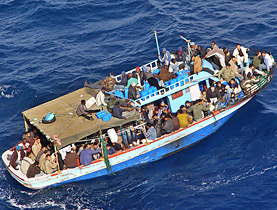Group calls for action over female trafficking

A campaign has been launched on International Women's Day aimed at highlighting the plight of trafficked women in Switzerland.
Supporters want to use the Euro 08 football championships, being co-hosted by Switzerland and Austria this summer, to draw attention to the issue – with male fans being a target.
“Euro 08 against Trafficking in Women”, a coalition of around 23 non-governmental organisations, has been holding demonstrations in four Swiss cities on Saturday and has also started a petition for the better protection of victims.
“Trafficked women are unfortunately also exploited in Switzerland,” said former parliamentarian and human rights campaigner Ruth-Gaby Vermot.
“Women are forced to work as prostitutes in brothels, as dancers in clubs or as household slaves,” she said at a media conference ahead of the International Day.
The Federal Police Office estimates that up to 3,000 people are smuggled into Switzerland every year, although the coalition says there could be far more unrecorded cases.
The group believes that affected women could be helped if the public, especially male clients, were better informed about the issue of trafficking.
More protection
It is also calling for victims to be given uniform rights and protection. Under Switzerland’s federal system, the country’s 26 cantons are in charge of the issue, resulting differing policies across the country. For many cantons, the coalition says, the first priority is immigration.
“In this way the victims are criminalised as illegal immigrants and deported instead of being recognised as victims,” Doro Winkler, of women’s organisation FIZ, told swissinfo.
The International Labour Organization (ILO) believes that each year around 2.5 million people are trafficked worldwide, with around 80 per cent being women. Tens of thousands end up in western Europe.
Some Swiss NGOs are trying to combat the problem at the source. World Vision Switzerland coordinates economic and social projects in Romania and Georgia – trafficking from eastern Europe is a major problem – which are financed by the Swiss Agency for Development and Cooperation (SDC).
“World Vision enjoys the confidence of the local population. Our work is well anchored,” said Stefanie Jud, World Vision’s programme manager for Eastern Europe.
Experts say that in virtually all cases of trafficking around the world, criminal syndicates play a dominant role.
Big problem, big money
According to the Organisation for Security and Cooperation in Europe (OSCE), the practice is worth around $35 billion (SFr36 billion) per annum – making it as lucrative as the drugs and arms trades.
Groups such as the Geneva-based organisation Defence for Children International (DCI) are warning that events such as the Euro 08 could also be affected.
“When you know that there are international events such as the European championships or any other major events, then you know that these people, who want to make money out of human misery, will find any way,” Altin Haziza, director of the DCI Albanian office, told swissinfo.
Haziza believes that the Swiss need to understand that poverty drives many women in the Balkan countries to put themselves at risk.
Most are drawn from relatively poor areas in countries with already low standards of living with assurances of a better life, he said.
For the human rights specialist, the only durable solution to female trafficking is to raise these standards of living.
swissinfo, Justin Häne and Etienne Strebel
Basel, Bern, Geneva and Zurich – Euro 08 host cities – have been holding demonstrations on March 8, International Women’s Day, to launch the campaign. Several hundred people are reported to have taken part. Smaller activities have been held elsewhere across Switzerland as well.
More action is planned for April and May.
A short information film will be shown on the large outdoor screens and on Swiss public television during the Euro 2008.
The event was started in 1910, but it was made official after the United Nations declared March 8 International Women’s Day in 1975
In his speech to mark the day this year, UN Secretary-General Ban Ki-moon has urged
nations to invest more spending on job opportunities, health care, nutrition and other pressing needs of women worldwide. He has also highlighted the problem of violence against women.
Apart from “Euro 08 against Trafficking in Women”, other organisations in Switzerland have flagged up domestic violence and working conditions ahead of the International Day.

In compliance with the JTI standards
More: SWI swissinfo.ch certified by the Journalism Trust Initiative









You can find an overview of ongoing debates with our journalists here . Please join us!
If you want to start a conversation about a topic raised in this article or want to report factual errors, email us at english@swissinfo.ch.